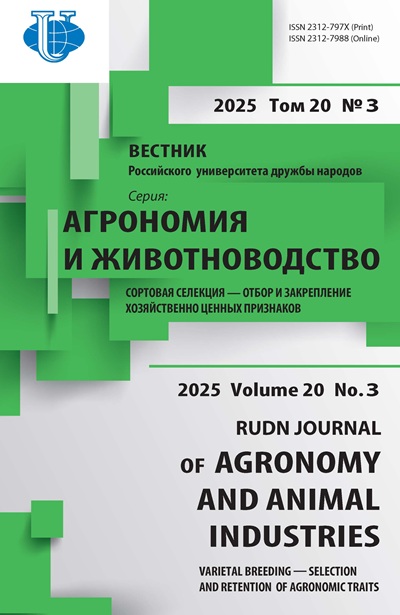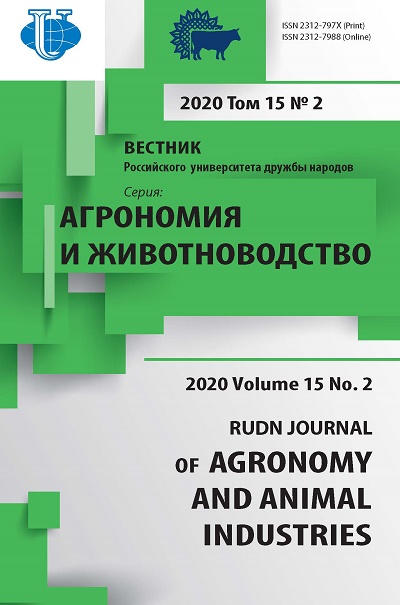Impact of cultivation technologies on yield and grain quality of winter wheat Triticum aestivum L. in Moscow region
- Authors: Rebouh N.Y.1, Polityko P.M.2, Kapranov V.N.2, Fedorischev V.N.2, Garmasch N.J.2, Atmachian G.P.1
-
Affiliations:
- Peoples’ Friendship University of Russia (RUDN University)
- Nemchinovka Federal Research Center
- Issue: Vol 15, No 2 (2020)
- Pages: 113-122
- Section: Crop production
- URL: https://agrojournal.rudn.ru/agronomy/article/view/19559
- DOI: https://doi.org/10.22363/2312-797X-2020-15-2-113-122
- ID: 19559
Cite item
Full Text
Abstract
The current study is aimed at evaluating the reaction of winter wheat varieties according to cultivation technologies at a different level of intensity i.e. basic, intensive and high intensive. The cultivation technologies included fertilizers, pesticides and growth regulators at different combinations and concentrations. The experiment was established in order to determine the optimum conditions of winter wheat cultivation. Three winter wheat varieties were studied: Moskovskaya 40 (V1), Nemchinovskaya 17 (V2) and Nemchinovskaya 85 (V3). Yield performances and grain quality (measured through protein and gluten content) were determined according to the tested cultivation technologies. The results showed that the cultivation technology affected grain wheat productivity and quality on all varieties studied, since the highest yields were obtained using high intensive cultivation technology for all varieties studied, Moskovskaya 40 - 9.65 t/h, Nemchinovskaya 17 - 8.58 t/h and Nemchinovskaya 85 - 9.87 t/h. However, according to the basic technology, the yield was lower by 20…64 %. The tested cultivation technologies demonstrated that high intensive cultivation technology increased wheat quality. The highest protein content (18 %) was recorded in Nemchinovskaya 85 variety. The present results give real opportunities for a largescale application of the tested cultivation technologies in different agricultural lands of Russia.
About the authors
Nazih Y. Rebouh
Peoples’ Friendship University of Russia (RUDN University)
Author for correspondence.
Email: n.rebouh@outlook.fr
PhD student, Agrobiotechnological Department
Moscow, Russian FederationPetr M. Polityko
Nemchinovka Federal Research Center
Email: niicrnz@mail.ru
Doctor of Agricultural Sciences, Professor, Head of the Laboratory of Varietal Technologies of Winter Grain Crops
Moscow region, Russian FederationVladimir N. Kapranov
Nemchinovka Federal Research Center
Email: niicrnz@mail.ru
Doctor of Agricultural Sciences, Leading Researcher, Laboratory of Varietal Technologies of Winter Grain Crops
Moscow region, Russian FederationViktor N. Fedorischev
Nemchinovka Federal Research Center
Email: fer@gmail.ru
Doctor of Agricultural Sciences
Moscow region, Russian FederationNina J. Garmasch
Nemchinovka Federal Research Center
Email: ni.juriev@yandex.ru
Doctor of Biological Sciences
Moscow region, Russian FederationGaik P. Atmachian
Peoples’ Friendship University of Russia (RUDN University)
Email: atmachian@gmail.com
PhD candidate, Agroengineering Department
Moscow, Russian FederationReferences
- Sandukhadze BI, Zhuravleva EV, Kochetygov GA. Ozimaya pshenitsa Nechernozem’ya v reshenii prodovol’stvennoi bezopasnosti Rossiiskoi Federatsi [Non-chernozem winter wheat in addressing the food security of the Russian Federation]. Moscow, Voshod - A publ., 2011; 156. (In Russ.)
- Alcamo J, Dronin N, Endejan M, Golubev G, Kirilenko A. A new assessment of climate change impacts on food production shortfalls and water availability in Russia. Global Environmental Change. 2007; 17(3- 4):429-444. doi: 10.1016/j.gloenvcha.2006.12.006
- Savary S, Ficke A, Aubertot JN, Clayton Hollier. Crop losses due to diseases and their implications for global food production losses and food security. Food Sec. 2012; 4(4):519-537. doi: 10.1007/s12571-012-0200-5
- Pakhomov VI, Rykov VB, Kambulov SI, Kambulov IA, Demina EB, Kolesnik VV. The quality of winter wheat grain in dependence to the cultivation technologies. Grain Economy of Russia. 2016; 48(6):55-59. (In Russ.)
- Polityko PM, Zhilyaev AM, Parygina MN, Volpe AA. Influence of growing conditions on germination, overwintering and productivity of new varieties of winter wheat. Herald of Russian State Agrarian Correspondence University. 2007; (4):48-51. (In Russ.)
- Polityko PM, Matyuta SV, Zyablova MN, Kiselev EF, Volpe AA, Bogdanov AY, et al. Varietal agrochemical and phytosanitary technologies of winter wheat cultivation in the central region of Russia. Problemy agrohimii i ekologii. 2012; (4):22-28. (In Russ.)
- Oliinyk KM, Davydiuk GV, Blazhevych LY, Khudoliy LV. Impact of cultivation technologies elements on winter wheat grain productivity and quality. Plant Varieties Studying and Protection. 2016; (4):45-50. (In Ukrainian) doi: 10.21498/2518-1017.4(33).2016.88671
- Ray DK, Mueller ND, West PC, Foley JA. Yield trends are insufficient to double global crop production by 2050. PLoS ONE. 2013; 8(6): e66428. doi: 10.1371/journal.pone.0066428
- Rebouh NY, Polityko PM, Pakina E, Plushikov VG, Norezzine A, Gadzhikurbanov A, et al. Impact of three integrated crop protection treatments on the varieties of winter wheat (Triticum aestivum L.) in Moscow area, Russia. Research on Crops. 2019; 20(1):161-168. doi: 10.31830/2348-7542.2019.022
- Rebouh NY, Polityko P, Latati M, Pakina E, Kapranov V, Imbia A, et al. Infl of three-pest management treatments against aphid, Sitobionavenae in winter wheat (Triticum aestivum L.) under Moscow area conditions. Research on Crops. 2019; 20(2):381-388. doi: 10.31830/2348-7542.2019.056
- Shi R, Zhang Y, Chen X, Sun Q, Zhang F, Roemheld V. Influence of longterm nitrogen fertilization on micronutrient density in grain of winter wheat (Triticum aestivum L.). J. Cereal Sci. 2010; 51(1):165-170. doi: 10.1016/j.jcs.2009.11.008
- Vaccino P, Corbellini M, Reffo G, Zoccatelli G, Migliardi M, Tavella L. Impact of Eurygaster maura (Heteroptera: Scutelleridae) feeding on quality of bread wheat in relation to attack period. J Econ Entomol. 2006; 99(3):757-763. doi: 10.1093/jee/99.3.757
- Wratten SD. The nature of the effects of the aphids, Sitobion avenae and Metopolophium dirhodum on the growth of wheat. Ann Appl Biol. (1975). 79(1):27-34. doi: 10.1111/j.1744-7348.1975.tb01518.x
- Zargar M, Polityko P, Pakina E, Bayat M, Vandyshev V, Kavhiza N, et al. Productivity, quality and economics of four spring wheat (Triticum aestivum L.) cultivars as affected by three cultivation technologies. Agronomy Research. 2018; 16(5):2254-2264. doi: 10.15159/AR.18.204
- Belamkar V, Guttieri MJ, Hussain W, Jarquín D, El-basyoni I, Poland J, et al. Genomic selection in preliminary yield trials in a winter wheat breeding program. G3: Genes, Genomes, Genetics. 2018; 8(8):2735- 2747. doi: 10.1534/g3.118.200415
- Chen XX, Zhang W, Liang XY, Liu YM1, Xu SJ, Zhao QY, et al. Physiological and developmental traits associated with the grain yield of winter wheat as affected by phosphorus fertilizer management. Sci Rep. 2019; 9(1):16580. doi: 10.1038/s41598-019-53000-z
- Cramer MD, Lewis OAM. The influence of nitrate and ammonium nutrition on the growth of wheat (Triticum aestivum) and maize (Zea mays) plants. Ann Bot. 1993; 72(4):359-365. doi: 10.1006/anbo.1993.1119
- Curci PL, Cigliano RA, Zuluaga DL, Janni M, Sanseverino W, Sonnante G. Transcriptomic response of durum wheat to nitrogen starvation. Scientific Reports. 2017; 7:1176. doi: 10.1038/s41598-017-01377-0
- Ercoli L, Masoni A, Pampana S, Mariotti M, Arduini I. As durum wheat productivity is affected by nitrogen fertilization management in Central Italy. European J Agron. 2013; 44:38-45. doi: 10.1016/j.eja.2012.08.005
- Jaleel CA, Gopi R, Panneerselvam R. Growth and photosynthetic pigments responses of two varieties of Catharanthus roseus to triadimefon treatment. Comptes Rendus Biologies. 2008; 331(4):272-277. doi: 10.1016/j.crvi.2008.01.004
- Ma C, Liu YN, Liang L, Zhai BN, Zhang HQ, Wang ZH. Effects of combined application of chemical fertilizer and organic manure on wheat yield and leaching of residual nitrate-N in dryland soil. The Journal of Applied Ecology. 2018; 29(4):1240-1248. (In Chineese) doi: 10.13287/j.1001-9332.201804.023
- Makino A. Photosynthesis, grain yield, and nitrogen utilization in rice and wheat. Plant Physiology. 2010; 155(1):125-129. doi: 10.1104/pp.110.165076
- Anderson WK. Closing the gap between actual and potential yield of rainfed wheat. The impacts of environment, management and cultivar. Field Crops Research. 2010; 116(1-2):14-22. doi: 10.1016/j. fcr.2009.11.016
- Marino S, Tognetti R, Alvino A. Effects of varying nitrogen fertilization on crop yield and grain quality of emmer grown in a typical Mediterranean environment in central Italy. European J Agron. 2011; 34(3):172-180. doi: 10.1016/j.eja.2010.10.006
Supplementary files















